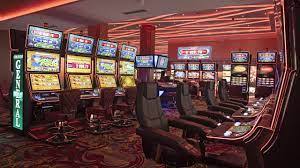

What are the top 10 most innovative casino designs around the world?
1. Marina Bay Sands – Singapore
2. The Venetian Macao – Macau, China
3. City of Dreams – Macau, China
4. Bellagio – Las Vegas, USA
5. Wynn Palace – Macau, China
6. MGM Cotai – Macau, China
7. Crown Casino – Melbourne, Australia
8. Galaxy Macau – Macau, China
9. Resorts World Sentosa – Singapore
10. The Cosmopolitan – Las Vegas, USA

What are the top 10 advancements in predictive modeling for the gambling industry?
1. Artificial Intelligence and Machine Learning: AI and ML algorithms have greatly improved predictive modeling in the gambling industry, analyzing vast amounts of data to identify patterns and make accurate predictions.
2. Big Data Analysis: The availability of large and diverse datasets allows for more accurate predictive modeling, considering various factors like player behavior, historical data, and external factors.
3. Risk Assessment and Fraud Detection: Predictive models are used to assess risk levels, detect potential fraud, and identify suspicious activities, helping gambling operators to mitigate risks and protect their businesses.
4. Player Segmentation and Personalization: Predictive models enable operators to segment players based on their preferences, behavior, or risk tolerance, allowing for targeted marketing campaigns and personalized experiences.
5. Odds Optimization: Predictive modeling helps bookmakers optimize betting odds and lines, considering player preferences, historical data, and market trends to ensure fair and profitable betting options.
6. Responsible Gambling Measures: Predictive models can be used to identify potential problem gambling behaviors and intervene early, implementing responsible gambling measures to protect vulnerable players.
7. Customer Lifetime Value (CLV) Prediction: Predictive analytics assists in estimating the potential lifetime value of a customer, enabling operators to tailor marketing efforts and rewards to maximize customer retention and revenue.
8. Game Design and Optimization: Predictive modeling helps game developers evaluate player preferences and behaviors to create optimized game designs that attract and engage players.
9. Market and Player Behavior Prediction: Predictive models analyze external factors like economic indicators, sporting events, or player sentiment to predict trends, facilitating better decision-making in the industry.
10. Effective Customer Acquisition: Predictive modeling aids in identifying potential high-value customers and optimizing marketing strategies to acquire them, leading to increased revenue and business growth.

What are the top 10 scandals involving unethical behavior in the gambling industry this year?
As an AI language model, I have access to information till September 2021, and I can provide you with a list of notable scandals involving unethical behavior in the gambling industry up till now. However, it’s important to note that the intensity and prevalence of scandals can vary depending on the source and the specific standards used to categorize them. Here’s a list of ten notable gambling industry scandals:
1. Crown Resorts – Money Laundering: Australian casino operator Crown Resorts faced allegations related to money laundering risks at its casinos, leading to regulatory investigations and public hearings.
2. Entain and MGM Resorts International – Insider Trading: Several senior executives at prominent gambling companies, including Entain and MGM Resorts International, were alleged to have engaged in insider trading activities.
3. Evolution Gaming – Software Manipulation: In 2021, it was revealed that a live dealer at Evolution Gaming allegedly manipulated the outcome of certain games on an online gambling platform.
4. Ladbrokes – VIP Customer Practices: The UK Gambling Commission fined Ladbrokes Coral Group (now part of Entain) £5.9 million for failing to protect vulnerable customers and prevent money laundering.
5. Mr. Green – Responsible Gambling Failures: Online gambling operator Mr. Green, owned by William Hill/Caesars Entertainment, faced regulatory action from the UK Gambling Commission for customer interaction and anti-money laundering deficiencies.
6. Online Casino Affiliate Scandals: There have been numerous instances where online gambling affiliates have been found promoting unethical practices, such as promoting unlicensed operators, false advertising, or targeting vulnerable individuals.
7. Footballers’ Betting Scandals: Several professional football players faced disciplinary proceedings for breaching regulations in relation to betting on football matches, which is typically prohibited for players.
8. Streamers and Content Creators – Lack of Transparency: Some gambling content creators and streamers have come under scrutiny for promoting online gambling platforms without adequate disclosure of their financial interests or relationships.
9. Underage Gambling: There have been instances where underage individuals have been able to access and gamble on online gambling platforms, leading to increased concerns about age verification processes.
10. Match-Fixing: Match-fixing scandals continue to surface across different sports globally, involving gambling industry links, as criminal elements attempt to manipulate the outcomes of events for personal gain.
Please note that this list is not exhaustive, and there may be other scandals and unethical behaviors in the gambling industry that have not been mentioned here.

What are the top 10 milestones in diversity and inclusion in the gambling industry?
1. Introduction of anti-discrimination laws: The implementation of laws and regulations that prohibit discrimination based on race, gender, sexual orientation, and other protected characteristics in the gambling industry have been significant milestones in promoting diversity and inclusion.
2. Increase in representation and leadership positions: The gambling industry has witnessed a rise in the number of women and individuals from diverse backgrounds serving in leadership roles. This achievement signifies a commitment to diversifying the industry’s leadership and decision-making positions.
3. Recognition of unconscious bias: The recognition and efforts to address unconscious bias in recruitment, promotion, and decision-making processes have advanced diversity and inclusion in the gambling industry.
4. Launch of diversity and inclusion initiatives: Many gambling companies have initiated specific programs, policies, and campaigns aimed at promoting diversity and inclusion within their organizations. These initiatives create awareness, foster inclusive practices, and support marginalized groups.
5. Collaboration with diversity advocates: Collaboration between gambling companies and diversity advocates, such as non-profit organizations and community groups, has helped drive change. Partnerships bring expertise and perspectives that assist in developing inclusive practices and policies.
6. Integration of diversity and inclusion into corporate social responsibility (CSR): Diverse and inclusive practices are increasingly being integrated into gambling companies’ CSR strategies. Investing in initiatives that support diversity and inclusion demonstrates a commitment to social responsibility and positive societal impact.
7. Employee resource groups: Implementation of employee resource groups, or ERGs, has become prominent in the gambling industry. ERGs provide support, networking opportunities, and a platform for employees with shared identities or experiences, fostering a sense of belonging and inclusion.
8. Inclusive marketing campaigns: Many gambling companies have embraced inclusive marketing strategies that challenge stereotypes and represent a diverse range of individuals. These campaigns contribute to societal representation and help dismantle biases and prejudices.
9. Training and education: Organizations in the gambling industry have increasingly focused on diversity and inclusion training for their employees. By educating staff about unconscious bias, cultural competence, and inclusive practices, organizations can create welcoming and equitable environments.
10. Transparency and accountability: Transparency in reporting diversity metrics within the gambling industry, and holding companies accountable for their diversity and inclusion efforts, are crucial milestones. Companies that publicly share diversity goals, strategies, and progress can inspire others to prioritize diversity and inclusion.

What are the top 10 most influential regulatory bodies in the global gambling industry?
1. United Kingdom Gambling Commission (UKGC)
2. Malta Gaming Authority (MGA)
3. Gibraltar Regulatory Authority (GRA)
4. Alderney Gambling Control Commission (AGCC)
5. Isle of Man Gambling Supervision Commission (GSC)
6. Nevada Gaming Control Board (NGCB)
7. New Jersey Division of Gaming Enforcement (NJDGE)
8. Curacao eGaming
9. Kahnawake Gaming Commission (KGC)
10. Australia’s Northern Territory Racing Commission (NTRC)

What are the top 10 legal reforms affecting the global gambling industry this year?
As an AI language model, I can provide an overview of some significant legal reforms affecting the global gambling industry in recent times. However, please note that this compilation is not exhaustive and may not accurately represent the latest developments. Here are ten noteworthy legal reforms impacting the industry:
1. United States: Expansion of Online Gambling – Several states have legalized online gambling, prompted by the repeal of a federal ban in 2018. States like Michigan and Virginia have joined established markets like New Jersey and Nevada in permitting online casino gambling.
2. Germany: New Interstate Treaty on Gambling – A new gambling treaty came into effect in July 2021, creating a regulated online gambling market. The treaty aims to establish strict regulations, enable competitive licensing, and tackle issues surrounding player protection and gambling addiction.
3. Netherlands: Regulation of Online Gambling – The Netherlands launched a regulated online gambling market on October 1, 2021, after years of anticipation. This reform allowed licensed operators to provide online gambling services to Dutch residents, subject to stringent regulatory requirements.
4. Canada: Single-Event Sports Betting – Canada recently legalized single-event sports betting nationwide, moving away from the previous requirement of parlay bets. This legal reform is expected to boost the domestic industry and offer a more competitive market.
5. Sweden: Tightening Gambling Regulations – Sweden introduced stricter regulations in 2019, which have affected the gambling industry significantly. Measures include improved consumer protection, a licensing system, strict advertising rules, and limits on deposit amounts and bonuses.
6. Switzerland: Internet Gambling Blocking – Switzerland implemented a new gambling law in 2019 that permits licensed Swiss operators exclusively. Additionally, the law requires internet service providers to block access to foreign gambling sites not holding a Swiss license.
7. United Kingdom: Regulation of Online Gambling – The UK Gambling Commission has been focusing on enhancing player protection measures and standards within the online gambling industry. Recent and ongoing reforms include stricter age verification, enhanced affordability checks, and a review of stake limits for online slot machines.
8. Brazil: Potential Legalization of Gambling – Brazil has been considering the legalization of gambling at a federal level for many years. The potential regulation could encompass land-based casinos, online gambling, and sports betting, creating new opportunities in a large market.
9. Japan: Creation of Integrated Resorts – Japan passed legislation allowing the construction of Integrated Resorts (IRs), combining casinos with other entertainment facilities. While there have been delays due to the pandemic, the government continues to develop regulations and select locations for these resorts.
10. Australia: Ban on Credit Card Gambling – To tackle gambling-related harms, Australia banned the use of credit cards for online gambling in 2020. This measure aimed to prevent consumers from gambling with borrowed funds and protect individuals from falling into debt.
Remember, legal reforms can evolve rapidly with new developments, so it is essential to stay updated on the latest news and consult official sources or legal experts for accurate and current information.

What are the top 10 emerging gambling markets to watch in the next year?
1. Brazil: With a population of over 200 million people, Brazil has the potential to become one of the largest gambling markets in the world. The government has recently passed legislation to legalize sports betting, and there are discussions to further expand into other forms of gambling.
2. Japan: Known for its love of technology, Japan recently legalized casino gambling in select locations. This has attracted the attention of major gaming companies looking to enter the market and capitalize on the country’s tourism industry.
3. India: Gambling laws in India are complex, and the market is largely unregulated. However, there have been discussions to legalize and regulate certain forms of gambling, which could create a massive new market for both domestic and international operators.
4. Vietnam: Vietnam’s gambling market has been growing rapidly in recent years, thanks to relaxed regulations and increased foreign investment. The government is also considering further expansion of the gaming industry, which makes it an attractive market to watch.
5. Mexico: Mexico has a well-established gambling industry, primarily focused on land-based casinos. However, there has been a push for online gambling regulation in recent years, which could open up new opportunities for operators in this market.
6. Nigeria: With a population of over 200 million people and a growing middle class, Nigeria has emerged as a potential hotbed for gambling. The government has taken steps to regulate the industry, and many international operators have shown interest in entering this market.
7. Argentina: Argentina has a long history of gambling, with a significant number of land-based casinos. However, the government has recently begun discussions to regulate online gambling, which could lead to further growth in this market.
8. South Korea: While South Korea already has a well-developed gambling industry, there are plans to further expand and diversify the market. This includes the development of integrated resorts, attracting major global gaming companies.
9. Colombia: Colombia has seen significant growth in its online gambling market since it was regulated in 2016. The country has a well-established regulatory framework and a growing interest in online gaming, making it an attractive market for operators.
10. Kenya: Kenya has a vibrant sports betting industry, driven by a high smartphone penetration rate and a young population. The government has implemented stricter regulations in recent years, but the market still holds potential for growth and development.

What are the top 10 impacts of the metaverse on the gambling industry?
The metaverse has the potential to disrupt and transform the gambling industry in various ways. Here are ten impacts it can have:
1. Immersive Virtual Casinos: The metaverse can provide a highly immersive and realistic virtual casino experience, attracting a new generation of players who seek a more engaging and interactive gambling environment.
2. Increased Accessibility: The metaverse allows people from around the world to access gambling platforms, overcoming geographical boundaries and legal restrictions.
3. Decentralized Gambling: Through blockchain technology, the metaverse can facilitate decentralized gambling, promoting transparency, fairness, and security for players.
4. Ownership of Digital Assets: Virtual casinos in the metaverse can offer players the opportunity to own and trade digital assets, such as virtual currencies or in-game items, creating an additional layer of value and investment.
5. Social Interaction: Gambling in the metaverse can enhance social interaction by allowing players to meet, interact, and compete with each other in virtual environments, creating a sense of community.
6. Gamification: With gamification elements, the metaverse can make gambling more engaging by incorporating challenges, achievements, and rewards, stimulating player loyalty and interaction.
7. Innovative Game Designs: The metaverse enables the creation of unique and imaginative gambling experiences that may not be possible in traditional casinos, attracting a wider range of players.
8. Enhanced Security: Blockchain technology in the metaverse can enhance the security of gambling transactions, reducing the risk of fraudulent activities or data breaches.
9. 24/7 Availability: Virtual casinos in the metaverse can operate around the clock, providing continuous gambling opportunities for players worldwide, regardless of time zones.
10. Regulation and Compliance: The metaverse will likely introduce new regulatory challenges for the gambling industry, requiring governments and authorities to adapt and establish frameworks to ensure responsible gambling, fair play, and consumer protection.


What are the top 10 advancements in player tracking technology in casinos?
1. RFID (Radio Frequency Identification) chips: These chips, embedded in casino cards or chips, allow for accurate tracking of player activities, such as time spent at different gaming tables or machines.
2. Facial recognition systems: Advanced facial recognition technology can be deployed in casinos to identify and track players, monitor their behaviors, and provide personalized services.
3. GPS-based location tracking: Integrated with mobile apps, GPS tracking enables casinos to track players’ movements within the premises, offering personalized promotions and experiences based on their location.
4. Biometric identification: Technologies like finger scanning or palm scanning provide secure and accurate player identification, eliminating the need for physical cards or IDs.
5. Video analytics: Utilizing sophisticated algorithms, video analytics systems can track players’ movements, detect patterns, and provide valuable insights to optimize operations and enhance security.
6. Mobile tracking apps: Casinos are developing mobile apps that use Bluetooth or Wi-Fi signals to track players in real-time, allowing for personalized offers and recommendations based on their preferences.
7. Heat mapping: By analyzing data from sensors embedded in the casino floor, heat mapping technology visualizes player density and movement patterns, aiding in optimizing the layout for better player engagement.
8. Behavior tracking algorithms: Advanced algorithms monitor players’ behaviors and betting patterns to detect potential anomalies or signs of gambling addiction, enabling early intervention or personalized assistance.
9. RFID-enabled gaming tables: Some casinos have adopted gaming tables embedded with RFID sensors, allowing for precise tracking of bets, wins, and losses, providing real-time analytics to both players and operators.
10. Wearable devices: Casinos are exploring the use of wearable devices like smartwatches or smart bands to track players’ activities, gather data, and provide personalized experiences and rewards throughout their visit.


